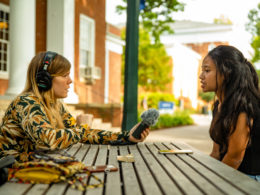In the wake of the events of the last year, it’s more important than ever to take care of your mental health. While it is not always the case among many of us, the fact is our mental health should be valued every bit as much as our physical health. That’s why breaking down the stigma of mental health is crucial in saving and helping more people.
May is Mental Health Awareness month, and we wanted to highlight a handful of local nonprofits to understand what they do, how you can support them and where to go if you or someone you know needs help.
Mental Health America of Virginia
Founded in 1937, Mental Health America of Virginia, or MHAV, is the oldest mental health advocacy nonprofit in Virginia. Its focus is on helping individuals through a peer recovery process. MHAV offers a number of resources. There are educational retreats for people who have experienced mental health crises and substance use issues as well as a Warm Line telephone line for people to call or text if they need mental health resources or someone non-judgmental to talk to. MHAV also runs a network for peer recovery specialists and provides ongoing advocacy and education from people who have been through and recovered from mental health crises. MHAV works toward a goal of seeing that every Virginian enjoys sound mental health. You can donate to help MHAV with its mission and help it change public policies that will bring about more services for improving mental health.
NAMI Central Virginia
Originally founded in 1980 as the Richmond Area Schizophrenia Foundation, NAMI Central Virginia came to fruition in 1998. NAMI Central VA offers a wide variety of resources from family support for whose loved ones have mental illness, advocacy for a destigmatized health care system, public education to reduce the stigma surrounding mental health, housing for people struggling with mental illness and research support to stay informed about current treatments and care. You can support them here.
VOCAL
Based in Richmond, VOCAL is a mental health nonprofit founded in 1999 by Brian Parrish and Cassandra Nudel. The organization is a statewide network that is solely based on peer support. In other words, it’s completely managed and run by peers. VOCAL offers people the opportunity to tell their personal stories of recovery; offers a newsletter to connect peers, trainings and jobs; deliver recovery education workshops; and advocate for mental health-related policies on the state and federal levels. If you haven’t experienced mental health issues, you’re still welcome to partner with VOCAL. Here’s how you can contribute to VOCAL’s mission.










